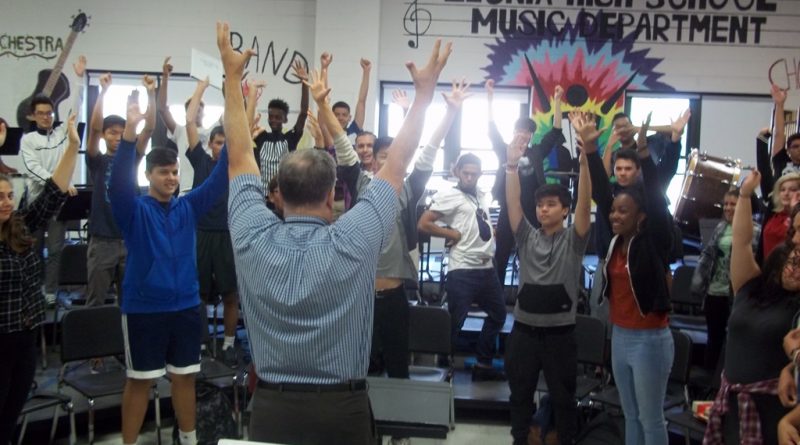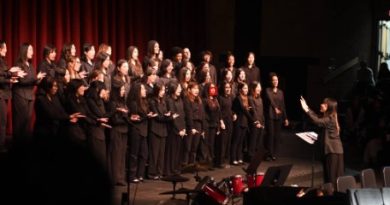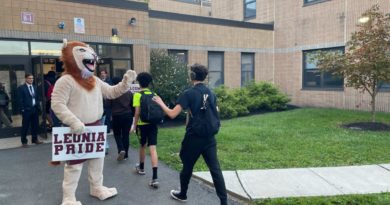More Than Notes
Leonia High School’s music department has a variety of vocal and instrumental ensembles – the Jazz Band, Chamber Choir, Wind Ensemble, and String Orchestra are just a few examples of the type of music you can find within the school community.
For the past few months, music directors Anthony Penn, Kerry Dunn, and Jack Rosenberg, have worked tirelessly to ensure that their respected ensembles were ready to face such an exciting yet challenging experience.
Recently attending a music competition in Williamsburg, Virginia, Leonia managed to take home most of the awards, including Best Band Overall, Best Orchestra, and Best Choir.
Mr. Rosenberg, the conductor of the orchestra, has been teaching in the Leonia school district since 2005.
A former math major at Brooklyn College with a minor in music, Rosenberg did an entire 180 and dropped math altogether, later attending Julliard as a violist. He went to school with Lillian Fuchs, a prominent American violist, teacher, and composer.
Before his professional career, he began playing music in elementary school, continuing into junior high and high school. Yet, while attending an engineering high school, he found himself pursuing a degree in mathematics.
“I wasn’t as advanced as a lot of other students that started earlier and had private lessons, so I went into college as a math major.”
He believed that it would be difficult to be successful as a musician at the time, and looked to continue studying math; but he never let go of music.
“I wasn’t worried about the money, I just was worried about having a successful career, doing something successfully. I wasn’t sure I could sort of catch up with the people around me in music – I wasn’t sure. But I realized after a while I just wanted to do music. I found it more gratifying to do that.”
While many of us might scratch our heads and ask why the sudden change, there was no question for Rosenberg. As he started to explore the musical world, he found he was becoming more proficient and successful at concerts and venues. Playing at that level had also given him a newfound confidence to play professionally.
On this journey through the musical world, he found one of his favorite venues.
“I was pretty lucky – I played in an orchestra that was in residence at the Metropolitan Museum of Art and they had soloists from all over the world and it was a wonderful chance to hear some of the greatest players and play with them, and I still remember many of those concerts and people that came and played with us.”
Despite playing music professionally, Rosenberg was around twenty-seven when he finally attended Julliard after getting his math degree at Brooklyn College and studying music part-time at the Manhattan School of Music.
“It was after I had already been a professional for almost a decade, and it was very strange to go back to school at that time in my life…I had been studying with Lillian Fuchs at Manhattan school, and she got a position at Juilliard and all of her class really went to Julliard to study with her there. It was an interesting opportunity at that time in my life.”
Lillian Fuchs, known for her incredible skill at the viola, was a well-known American violist, teacher, and composer. She inspired many, including her students. Similar to Fuchs, Rosenberg’s primary instrument was the viola.
Before going to Julliard, many musicians, Fuchs and Rosenberg included, had already been playing professionally.
“Most people who go to Julliard already played at a professional level before they go there, so to go to a school like that is really to meet people from around the world and sort of a microcosm of the whole-world music scene. People don’t really learn to play their instruments there, they learn how to interact with other musicians on that level.”
Although meeting new musicians was an important part of Julliard and the musical world, Rosenberg learned how to work with others seeking the same life. It wasn’t always easy.
“I think the difficult part really was finding your own personal way of working with other professional musicians and fitting into that lifestyle and both technically and interactively as a person. You have to play really well and be flexible and work well with other people – it’s a lot, it’s a lot to do.”
As a musician, one of the most important aspects is making sure that sounds work together. Playing as a soloist is far different than playing in a large group. As a soloist, there is only your sound that you can control. In an ensemble, your sound is combined with the sound of several, even hundreds, of others. Sometimes the smallest change can make the most difference – for better or for worse
“It’s much more than playing notes, but it’s true in every profession – in medicine, in business. It’s not just doing your job with blinders on. I think for musicians you have to be flexible with your sound and your articulation and your rhythm – all the things that go into music you have to have that flexibility otherwise you really can’t work in an ensemble.”
Because being able to fit into the sound of someone else is so important, failing to do so can lead to difficulty.
“Those people that can’t have that ‘fitting in’- it just doesn’t work out for them. It’s something you have to learn pretty soon as a professional otherwise they don’t like you there – you make a mess. It doesn’t sound right, the sections don’t sound right. It’s like an awareness of what’s going on around you. It’s a really good life skill.”
For Rosenberg, he’d seen his fair share of talented musicians get burnt out and defeated from trying to play in ensembles.
“Along the way, a lot of my colleagues in Julliard… really got discouraged. They got discouraged about the competition or they weren’t the star player and they wound up giving up something in their lives that might have been really rewarding for the course of their whole lives.”
This might seem daunting initially, but it wasn’t always filled with struggles. For instance, on his musical path, Rosenberg discovered a love of travel.
“I think this is a very special strada of music because it allows you to share your music and make music with people from totally different places, and I think that for most musicians if you can achieve that level or that lifestyle then I think you really get the best out of being in music.”
At Leonia, one of the most significant events within the music department is the music trip in which all music ensembles travel overnight for several days to a nearby state to compete at a festival. Most recently, the students traveled to Virginia. Before Covid, the school went to Washington D.C.
“Even in the trips we take feel like that – of playing for other people and I think, aside from making the music, just being in a different place and seeing people that you’ve never seen before and eating the foods and playing concerts for audiences that you’ve never seen before is sort of the gist of what it means to speak a universal language. So if one can sort of make it to that level, then you can really experience what a lifestyle in music has to offer.”
For Rosenberg, it’s less about the rewards and awards given to the musicians and more about the experiences you create and encounter.
“I always said that we always want to get a gold medal but as a professional musician, what orchestras try to do is get reengaged to be reinvited back to Japan, being invited back to a festival somewhere – that’s what really makes an orchestra really work as a team because you want to be successful not just to get a good review of a concert but to be invited back the next season to the place. It’s a good part of music – it’s like being on a professional sports team. We want to be in that venue – it’s similar in music.”
In fact, some of his funniest musical stories occurred while traveling to different countries for international performances.
“We went to Tokyo and the basses were unloaded in a shipping container and it was 100 degrees or more and they melted – they melted on the tarmac.”
It sounds like a disaster to us now, but Rosenberg can look back and laugh.
“Once I was traveling in Italy with Orpheius and the customs people would not allow the instruments to enter the country. And we arrived at our concert hall but we had no instruments – or some of us didn’t – and we had to go to the local town and have people give us instruments to play.”
After playing music professionally for a number of years, Rosenberg began looking at teaching and education. However, it didn’t just happen overnight.
“Truthfully, I think most people in music become teachers pretty early in their lives, even as students… I always taught and I ran some educational programs through the orchestras I was in but being a music teacher at a school like Leonia High School is very different than that because it’s really a responsibility and something to do, so it’s a real responsibility in life. I actually came here in 2005 – to the high school…Because of the way our schedules work out, I taught at ACS after a number of years and I still teach there with Mr. Holak.”
Working with both the high school and elementary school, he’s seen his fair share of talent. But for him, the different levels of skill and ability are of little consequence.
“To me it doesn’t matter whether I’m dealing with beginning students or middle students – it doesn’t matter to me. I’m just glad to deal with people that are making music – it’s a fun life.”
His experience working with students and being a professional musician has made him realize the importance of leading a fun life with balance. He’s seen students and fellow musicians neglect their early lives to pursue a forced interest in music.
“I think there’s time enough in life to do things when you find out what is meaningful to you, otherwise your parents are forcing you to do it and everyone applauds…I dont think it helps people as individuals to be that advanced at age ten, I just don’t. I think the years that are your teen years and college years – there’s more than enough time to do what you want.”
As someone who used his teen and college years to explore his interests, he truly believes and supports this philosophy.
“Music is hard – it’s really hard to catch up to people. At age seventeen or eighteen when people were in high school I was sort of behind the curve, but by the time I was thirty I was not. So that’s okay too. I practiced a lot. I had my whole life in music and I was successful enough. So instead of doing it between the ages of seven and seventeen I did it between the ages of seventeen and twenty-seven – what difference does it make?”
Musical experience has always been one of the most important factors in Rosenberg’s life. Switching from math to music, he found a career he loved and appreciated more than any other.
“That’s what college is for, really. It’s for you to decide what matters to you and the way you want to spend your days and work toward whatever – scholarship, or production, or musical instrument – what gives you that enjoyment. The worst thing you can do is go into a field to earn money and hate it and not look forward to spending your days.”
Despite this, being a musician had its difficulties and struggles – even at the professional level.
“I have to tell you, as a professional musician, there’s constant worry of making money. It’s part of the life I never liked. If you have two hours in your schedule you’d fit a recording session or you can do this or teach another lesson – it’s this constant thing. On all levels of music making, it never leaves you.”
Through all the hardships and challenges, he persisted because he loved music. What’s important to him and his journey is the fact that he stuck with music throughout his whole life. Although he might have been intimidated by the skill and ability of others or the financial difficulties, he continued to practice and eventually sought a life in the musical world.
“I think you have to have the persistence to do something that means something to you. I don’t know, it worked for me. By the time I was twenty-seven or twenty-eight, I really was successful in music and it was fine. I wasn’t at seventeen or eighteen, but soon after that I was. People are very impatient if they don’t get an A+ in calculus or whatever right away they say ‘oh how can I compete’ – and it’s true, I know how you feel, but you might do it if you want to do it, if that’s what you want to do. I think that’s the real leveler – your persistence of doing what you want to do.”
Music is a journey both for an individual and a group. It’s a journey of reflection, teamwork, and self-improvement. While it’s important to practice your craft and become the best version of yourself that you can, it’s important to hold onto confidence.
“I really think you have to believe in yourself, if you decide this is what’s meaningful to me, you will keep at it and then you will be successful at it. I really believe that. You don’t need an A+ or a gold medal or someone to applaud to tell you ‘re successful. I think you can figure out how to do it. You don’t always need the affirmation of the world to say you got an A+, you got a PhD – you can do what you want. I think most people that are successful and really lead rewarding lives do it because they believe in themselves.”
Rosenberg now teaches at Leonia High School as a music teacher for classes like orchestra, advanced music theory, and musicianship. In his orchestra class, he likes to express how important emotion is in music.
As he explained to his class that music transcends the importance of notes, he enthusiastically said “Don’t just play notes – play feeling!”
He later explained that while notes are important in music, it’s more important to invoke a sense of emotion to the audience. Otherwise, people won’t walk away with a new sense of realization in their lives. Music is an art, and art is supposed to be moving.
“Make people feel that they’re glad to be on this earth!”



